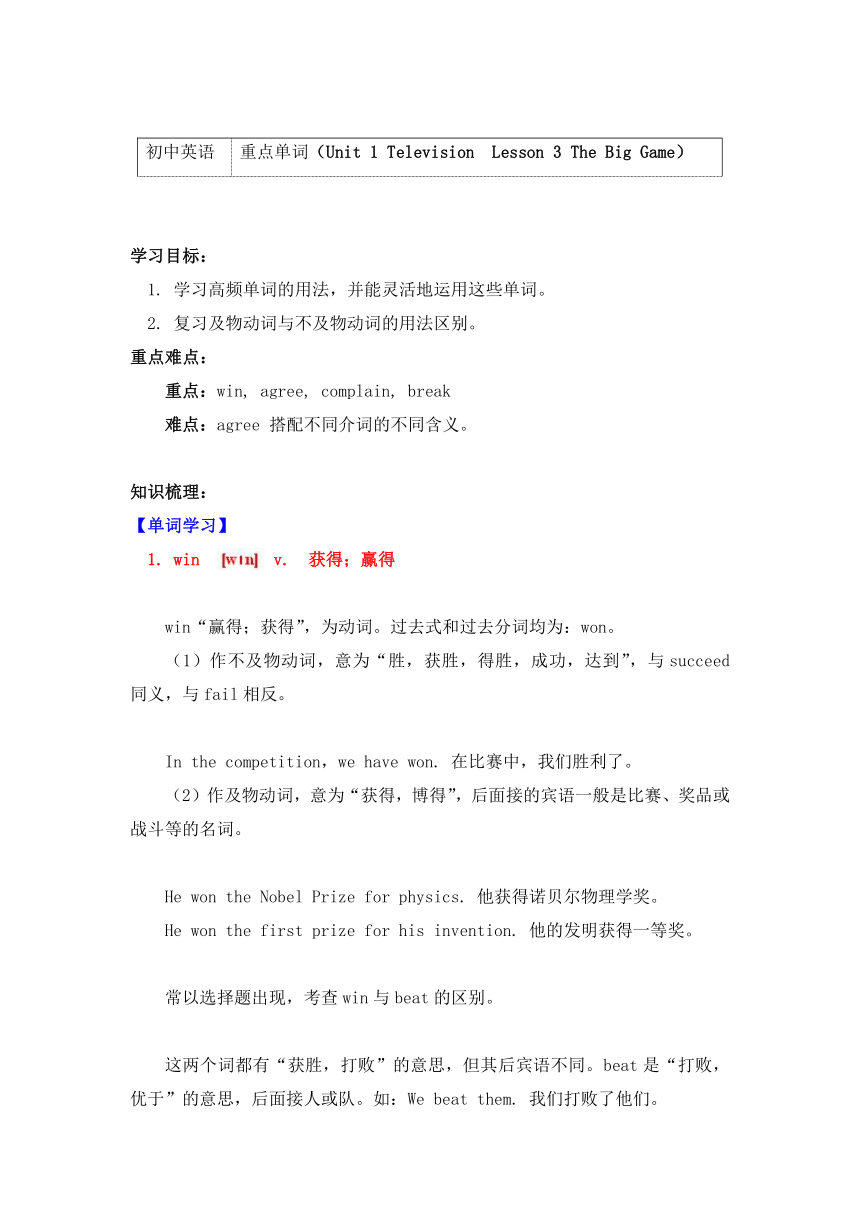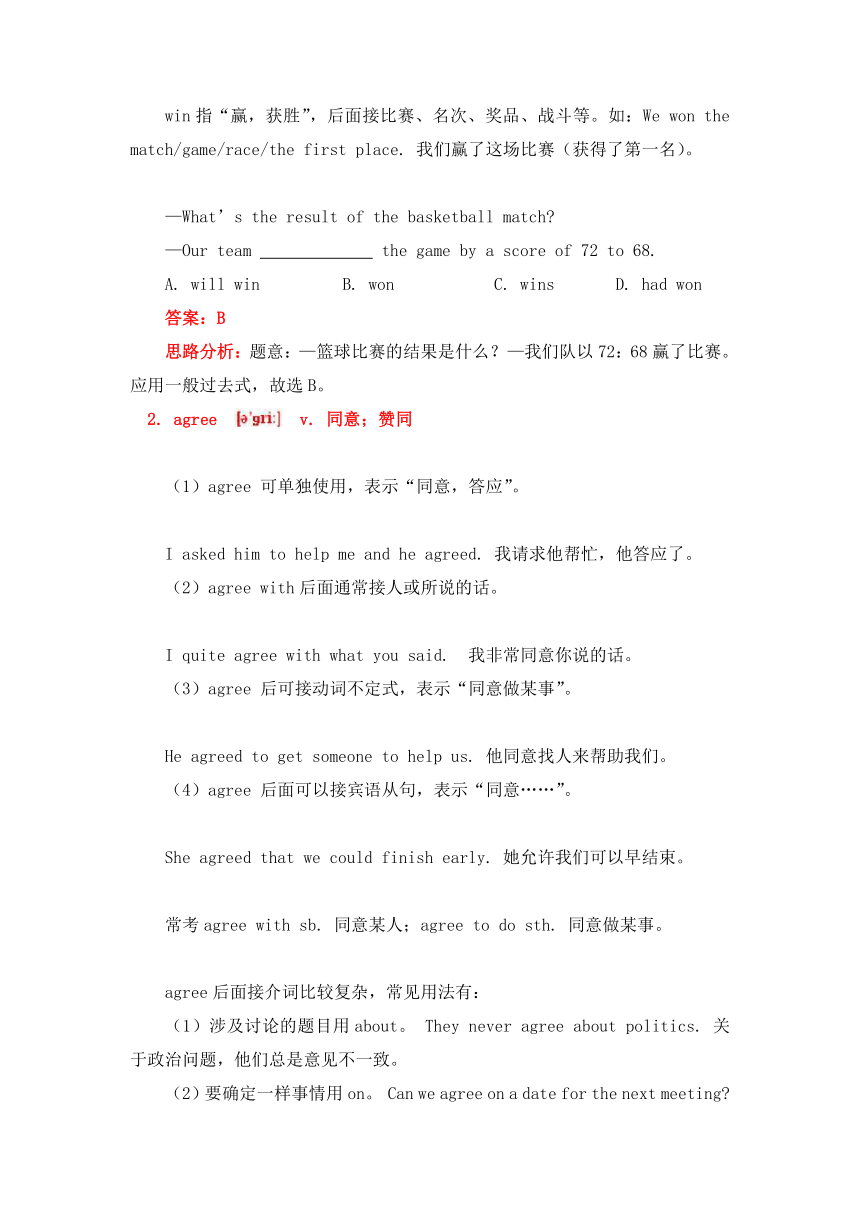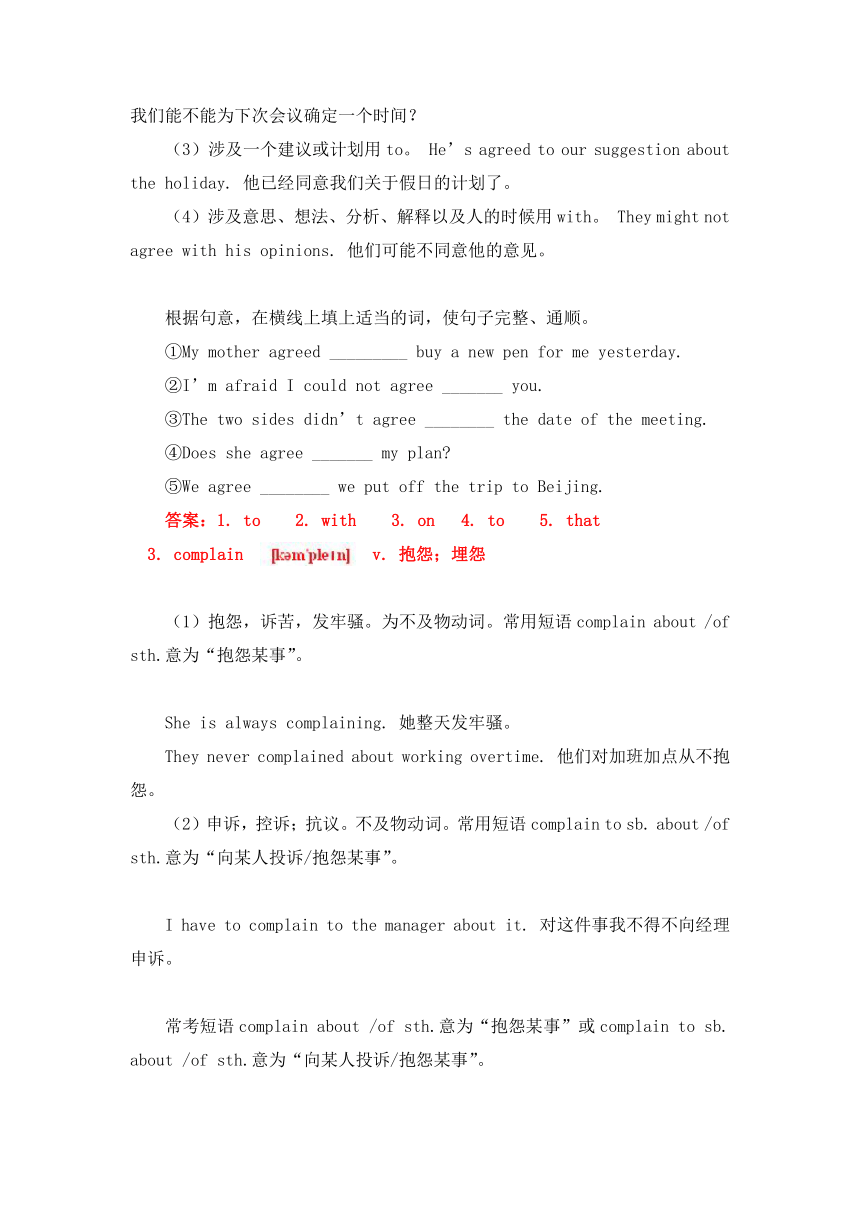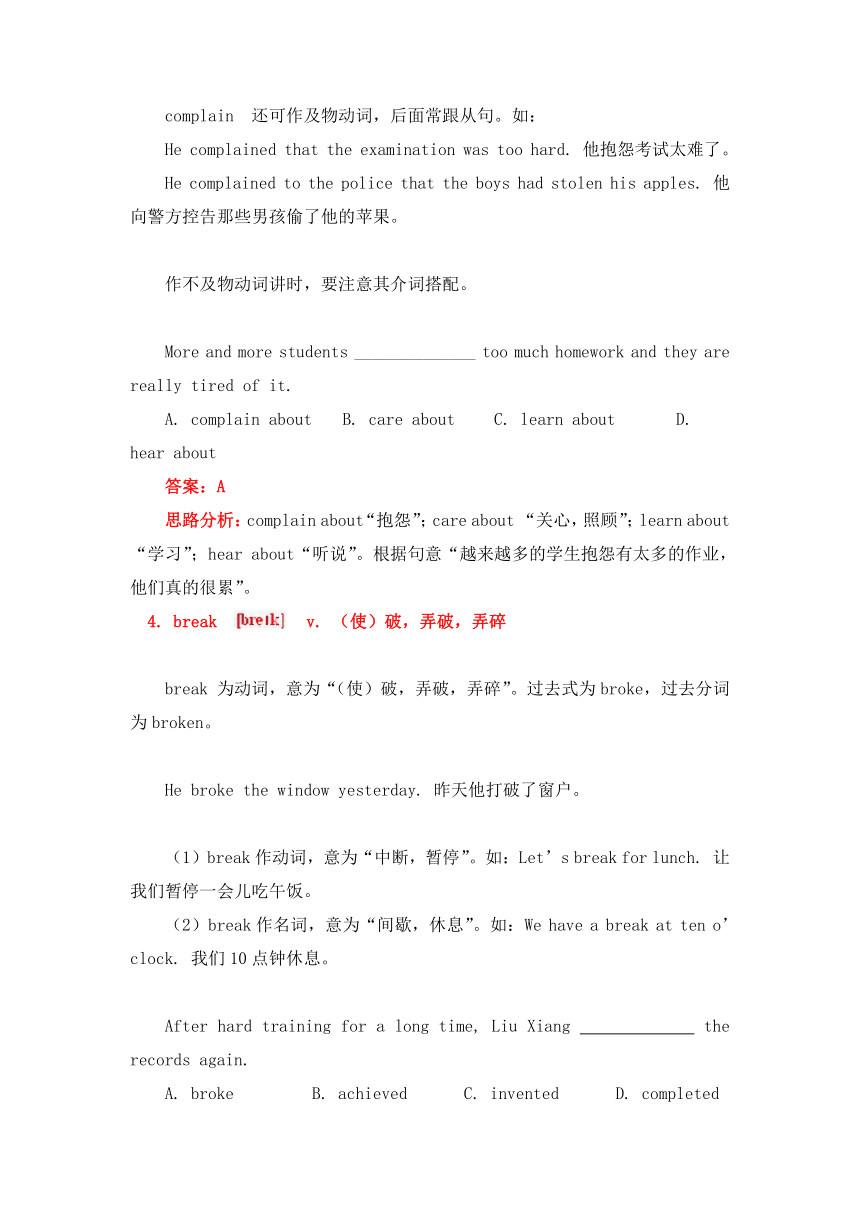Unit 1 Television Lesson 3 The Big Game 导学案(含答案)
文档属性
| 名称 | Unit 1 Television Lesson 3 The Big Game 导学案(含答案) |

|
|
| 格式 | doc | ||
| 文件大小 | 62.5KB | ||
| 资源类型 | 教案 | ||
| 版本资源 | 北师大版 | ||
| 科目 | 英语 | ||
| 更新时间 | 2020-09-25 00:00:00 | ||
图片预览




文档简介
初中英语 重点单词(Unit 1 Television Lesson 3 The Big Game)
学习目标:
1. 学习高频单词的用法,并能灵活地运用这些单词。
2. 复习及物动词与不及物动词的用法区别。
重点难点:
重点:win, agree, complain, break
难点:agree 搭配不同介词的不同含义。
知识梳理:
【单词学习】
1. win v. 获得;赢得
win“赢得;获得”,为动词。过去式和过去分词均为:won。
(1)作不及物动词,意为“胜,获胜,得胜,成功,达到”,与succeed同义,与fail相反。
In the competition,we have won. 在比赛中,我们胜利了。
(2)作及物动词,意为“获得,博得”,后面接的宾语一般是比赛、奖品或战斗等的名词。
He won the Nobel Prize for physics. 他获得诺贝尔物理学奖。
He won the first prize for his invention. 他的发明获得一等奖。
常以选择题出现,考查win与beat的区别。
这两个词都有“获胜,打败”的意思,但其后宾语不同。beat是“打败,优于”的意思,后面接人或队。如:We beat them. 我们打败了他们。
win指“赢,获胜”,后面接比赛、名次、奖品、战斗等。如:We won the match/game/race/the first place. 我们赢了这场比赛(获得了第一名)。
—What’s the result of the basketball match?
—Our team the game by a score of 72 to 68.
A. will win B. won C. wins D. had won
答案:B
思路分析:题意:—篮球比赛的结果是什么?—我们队以72:68赢了比赛。应用一般过去式,故选B。
2. agree v. 同意;赞同
(1)agree 可单独使用,表示“同意,答应”。
I asked him to help me and he agreed. 我请求他帮忙,他答应了。
(2)agree with后面通常接人或所说的话。
I quite agree with what you said. 我非常同意你说的话。
(3)agree 后可接_??¨è???????????_,表示“同意做某事”。
He agreed to get someone to help us. 他同意找人来帮助我们。
(4)agree 后面可以接宾语从句,表示“同意……”。
She agreed that we could finish early. 她允许我们可以早结束。
常考agree with sb. 同意某人;agree to do sth. 同意做某事。
agree后面接介词比较复杂,常见用法有:
(1)涉及讨论的题目用about。 They never agree about politics. 关于政治问题,他们总是意见不一致。
(2)要确定一样事情用on。 Can we agree on a date for the next meeting? 我们能不能为下次会议确定一个时间?
(3)涉及一个建议或计划用to。 He’s agreed to our suggestion about the holiday. 他已经同意我们关于假日的计划了。
(4)涉及意思、想法、分析、解释以及人的时候用with。 They might not agree with his opinions. 他们可能不同意他的意见。
根据句意,在横线上填上适当的词,使句子完整、通顺。
①My mother agreed _________ buy a new pen for me yesterday.
②I’m afraid I could not agree _______ you.
③The two sides didn’t agree ________ the date of the meeting.
④Does she agree _______ my plan?
⑤We agree ________ we put off the trip to Beijing.
答案:1. to 2. with 3. on 4. to 5. that
3. complain v. 抱怨;埋怨
(1)抱怨,诉苦,发牢骚。为不及物动词。常用短语complain about /of sth.意为“抱怨某事”。
She is always complaining. 她整天发牢骚。
They never complained about working overtime. 他们对加班加点从不抱怨。
(2)申诉,控诉;抗议。不及物动词。常用短语complain to sb. about /of sth.意为“向某人投诉/抱怨某事”。
I have to complain to the manager about it. 对这件事我不得不向经理申诉。
常考短语complain about /of sth.意为“抱怨某事”或complain to sb. about /of sth.意为“向某人投诉/抱怨某事”。
complain 还可作及物动词,后面常跟_??????_。如:
He complained that the examination was too hard. 他抱怨考试太难了。
He complained to the police that the boys had stolen his apples. 他向警方控告那些男孩偷了他的苹果。
作不及物动词讲时,要注意其介词搭配。
More and more students ______________ too much homework and they are really tired of it.
A. complain about B. care about C. learn about D. hear about
答案:A
思路分析:complain about“抱怨”;care about “关心,照顾”;learn about“学习”;hear about“听说”。根据句意“越来越多的学生抱怨有太多的作业,他们真的很累”。
4. break v. (使)破,弄破,弄碎
break 为动词,意为“(使)破,弄破,弄碎”。过去式为broke,过去分词为broken。
He broke the window yesterday. 昨天他打破了窗户。
(1)break作动词,意为“中断,暂停”。如:Let’s break for lunch. 让我们暂停一会儿吃午饭。
(2)break作名词,意为“间歇,休息”。如:We have a break at ten o’clock. 我们10点钟休息。
After hard training for a long time, Liu Xiang the records again.
A. broke B. achieved C. invented D. completed
答案:A
思路分析:句意:经过长时间的艰苦训练,刘翔又打破了纪录。break the record打破纪录;achieve,取得;invent,发明;complete,完成。根据句意选A。
即学即练:
1. —How many gold medals did China at the 2010 Winter Olympics?
—Five.
A. win B. beaten C. beat D. won
答案:A
思路分析:题中助动词为did,故应用动词原形,赢多少枚金牌,应用win,故选A。
2. —Jason is too stubborn(固执)sometimes.
—I quite . But he’s always friendly to others.
A. accept B. argue C. agree D. admire
答案:C
思路分析:accept“接受”;argue“争吵”;agree“同意”;admire“羡慕”。
3. —English is spoken by the most people in the world.
—Really? I don’t quite ___________ you.
A. agree to B. agree with C. agreed with D. agree
答案:B
思路分析:同意某人,用agree with sb.,故选B。
4. It’s no use complaining me about it.
A. / B. with C. to D. about
答案:C
思路分析:complain to sb. about /of sth.意为“向某人投诉/抱怨某事”。故选C。
5. —Why don’t we take a little ?
—Didn’t we just have one?
A. breaks B. breaking C. break D. broken
答案:C
思路分析:take a little break意为“稍微休息一会儿”。a little后接不可数名词,故选C。
同步练习:
(答题时间:15分钟)
一、用agree的正确形式填空
1. I asked him to help me and he _____.
2. I quite______ their suggestions.
3. The date for the next meeting was ______.
4. I quite _______ what you said.
5. I ______ the plan.
6. Most scientists _____ that computers cannot completely take the place of human beings.
7. They ________ going there the following day.
8. At last, the boss _____ that I should do the work.
9. It was_____ that another meeting was necessary.
10. The enemy generals could not _______ one another,they quarreled the whole night.
二、词语运用
1. You have no reason (抱怨).
2. He won (一等奖)at the competition.
3. I’m not (开玩笑), Frank. There’s a cow out there, just standing around...
4. That was a bad (判决).
5. Jimmy was sent off for (犯规)Steve.
三、根据语篇内容,用方框中所给词的正确形式填空,使短文通顺、连贯。方框中有两个词为多余项。
one quick write except interest late story unless young
Gao Can, a 13-year-old girl, is the 1 member who likes to write fairy tales, short 2 , and most of all, poems. Gao said she began poem writing when she was in primary school. Once the teacher asked the class 3 a composition called “If I were…” Gao had an idea, “Why not make it a poem?” That was her 4 poem, and it won a lot of compliments from both her teacher and classmates. So far, hundreds of her poems have come out.
“Writing poems is not difficult at all. Just express yourselves what you do, what you see or what you think.” Said Gao, “I don’t have enough life experience, so I write about nature, about things I feel inside.”
However, teenagers these days seldom write poem or read them because exams want any kind of articles 5 poems.
But like Gao, there are still students who like poems. Hu Jingzhi is one of them. The 14-year-old boy said he was 6 in poem writing. But it was annoying that he couldn’t find poem collections in nearby bookshops.
Gao agreed with Hu. She said today’s bookshops were filled with books on “how to give a successful speech”, “how to know what others think” or “how to make money 7 ”.
答案:
一、用agree的正确形式填空
1. agreed 2. agree to 3. agreed on 4. agree with 5. agree to
6. agreed 7. agreed on 8. agreed 9. agreed 10. agree with
二、词语运用
1. to complain 2. the first prize 3. kidding 4. call 5. fouling
三、填空
1. youngest 2. stories 3. to write 4. first 5. except 6. interested 7. quickly
学习目标:
1. 学习高频单词的用法,并能灵活地运用这些单词。
2. 复习及物动词与不及物动词的用法区别。
重点难点:
重点:win, agree, complain, break
难点:agree 搭配不同介词的不同含义。
知识梳理:
【单词学习】
1. win v. 获得;赢得
win“赢得;获得”,为动词。过去式和过去分词均为:won。
(1)作不及物动词,意为“胜,获胜,得胜,成功,达到”,与succeed同义,与fail相反。
In the competition,we have won. 在比赛中,我们胜利了。
(2)作及物动词,意为“获得,博得”,后面接的宾语一般是比赛、奖品或战斗等的名词。
He won the Nobel Prize for physics. 他获得诺贝尔物理学奖。
He won the first prize for his invention. 他的发明获得一等奖。
常以选择题出现,考查win与beat的区别。
这两个词都有“获胜,打败”的意思,但其后宾语不同。beat是“打败,优于”的意思,后面接人或队。如:We beat them. 我们打败了他们。
win指“赢,获胜”,后面接比赛、名次、奖品、战斗等。如:We won the match/game/race/the first place. 我们赢了这场比赛(获得了第一名)。
—What’s the result of the basketball match?
—Our team the game by a score of 72 to 68.
A. will win B. won C. wins D. had won
答案:B
思路分析:题意:—篮球比赛的结果是什么?—我们队以72:68赢了比赛。应用一般过去式,故选B。
2. agree v. 同意;赞同
(1)agree 可单独使用,表示“同意,答应”。
I asked him to help me and he agreed. 我请求他帮忙,他答应了。
(2)agree with后面通常接人或所说的话。
I quite agree with what you said. 我非常同意你说的话。
(3)agree 后可接_??¨è???????????_,表示“同意做某事”。
He agreed to get someone to help us. 他同意找人来帮助我们。
(4)agree 后面可以接宾语从句,表示“同意……”。
She agreed that we could finish early. 她允许我们可以早结束。
常考agree with sb. 同意某人;agree to do sth. 同意做某事。
agree后面接介词比较复杂,常见用法有:
(1)涉及讨论的题目用about。 They never agree about politics. 关于政治问题,他们总是意见不一致。
(2)要确定一样事情用on。 Can we agree on a date for the next meeting? 我们能不能为下次会议确定一个时间?
(3)涉及一个建议或计划用to。 He’s agreed to our suggestion about the holiday. 他已经同意我们关于假日的计划了。
(4)涉及意思、想法、分析、解释以及人的时候用with。 They might not agree with his opinions. 他们可能不同意他的意见。
根据句意,在横线上填上适当的词,使句子完整、通顺。
①My mother agreed _________ buy a new pen for me yesterday.
②I’m afraid I could not agree _______ you.
③The two sides didn’t agree ________ the date of the meeting.
④Does she agree _______ my plan?
⑤We agree ________ we put off the trip to Beijing.
答案:1. to 2. with 3. on 4. to 5. that
3. complain v. 抱怨;埋怨
(1)抱怨,诉苦,发牢骚。为不及物动词。常用短语complain about /of sth.意为“抱怨某事”。
She is always complaining. 她整天发牢骚。
They never complained about working overtime. 他们对加班加点从不抱怨。
(2)申诉,控诉;抗议。不及物动词。常用短语complain to sb. about /of sth.意为“向某人投诉/抱怨某事”。
I have to complain to the manager about it. 对这件事我不得不向经理申诉。
常考短语complain about /of sth.意为“抱怨某事”或complain to sb. about /of sth.意为“向某人投诉/抱怨某事”。
complain 还可作及物动词,后面常跟_??????_。如:
He complained that the examination was too hard. 他抱怨考试太难了。
He complained to the police that the boys had stolen his apples. 他向警方控告那些男孩偷了他的苹果。
作不及物动词讲时,要注意其介词搭配。
More and more students ______________ too much homework and they are really tired of it.
A. complain about B. care about C. learn about D. hear about
答案:A
思路分析:complain about“抱怨”;care about “关心,照顾”;learn about“学习”;hear about“听说”。根据句意“越来越多的学生抱怨有太多的作业,他们真的很累”。
4. break v. (使)破,弄破,弄碎
break 为动词,意为“(使)破,弄破,弄碎”。过去式为broke,过去分词为broken。
He broke the window yesterday. 昨天他打破了窗户。
(1)break作动词,意为“中断,暂停”。如:Let’s break for lunch. 让我们暂停一会儿吃午饭。
(2)break作名词,意为“间歇,休息”。如:We have a break at ten o’clock. 我们10点钟休息。
After hard training for a long time, Liu Xiang the records again.
A. broke B. achieved C. invented D. completed
答案:A
思路分析:句意:经过长时间的艰苦训练,刘翔又打破了纪录。break the record打破纪录;achieve,取得;invent,发明;complete,完成。根据句意选A。
即学即练:
1. —How many gold medals did China at the 2010 Winter Olympics?
—Five.
A. win B. beaten C. beat D. won
答案:A
思路分析:题中助动词为did,故应用动词原形,赢多少枚金牌,应用win,故选A。
2. —Jason is too stubborn(固执)sometimes.
—I quite . But he’s always friendly to others.
A. accept B. argue C. agree D. admire
答案:C
思路分析:accept“接受”;argue“争吵”;agree“同意”;admire“羡慕”。
3. —English is spoken by the most people in the world.
—Really? I don’t quite ___________ you.
A. agree to B. agree with C. agreed with D. agree
答案:B
思路分析:同意某人,用agree with sb.,故选B。
4. It’s no use complaining me about it.
A. / B. with C. to D. about
答案:C
思路分析:complain to sb. about /of sth.意为“向某人投诉/抱怨某事”。故选C。
5. —Why don’t we take a little ?
—Didn’t we just have one?
A. breaks B. breaking C. break D. broken
答案:C
思路分析:take a little break意为“稍微休息一会儿”。a little后接不可数名词,故选C。
同步练习:
(答题时间:15分钟)
一、用agree的正确形式填空
1. I asked him to help me and he _____.
2. I quite______ their suggestions.
3. The date for the next meeting was ______.
4. I quite _______ what you said.
5. I ______ the plan.
6. Most scientists _____ that computers cannot completely take the place of human beings.
7. They ________ going there the following day.
8. At last, the boss _____ that I should do the work.
9. It was_____ that another meeting was necessary.
10. The enemy generals could not _______ one another,they quarreled the whole night.
二、词语运用
1. You have no reason (抱怨).
2. He won (一等奖)at the competition.
3. I’m not (开玩笑), Frank. There’s a cow out there, just standing around...
4. That was a bad (判决).
5. Jimmy was sent off for (犯规)Steve.
三、根据语篇内容,用方框中所给词的正确形式填空,使短文通顺、连贯。方框中有两个词为多余项。
one quick write except interest late story unless young
Gao Can, a 13-year-old girl, is the 1 member who likes to write fairy tales, short 2 , and most of all, poems. Gao said she began poem writing when she was in primary school. Once the teacher asked the class 3 a composition called “If I were…” Gao had an idea, “Why not make it a poem?” That was her 4 poem, and it won a lot of compliments from both her teacher and classmates. So far, hundreds of her poems have come out.
“Writing poems is not difficult at all. Just express yourselves what you do, what you see or what you think.” Said Gao, “I don’t have enough life experience, so I write about nature, about things I feel inside.”
However, teenagers these days seldom write poem or read them because exams want any kind of articles 5 poems.
But like Gao, there are still students who like poems. Hu Jingzhi is one of them. The 14-year-old boy said he was 6 in poem writing. But it was annoying that he couldn’t find poem collections in nearby bookshops.
Gao agreed with Hu. She said today’s bookshops were filled with books on “how to give a successful speech”, “how to know what others think” or “how to make money 7 ”.
答案:
一、用agree的正确形式填空
1. agreed 2. agree to 3. agreed on 4. agree with 5. agree to
6. agreed 7. agreed on 8. agreed 9. agreed 10. agree with
二、词语运用
1. to complain 2. the first prize 3. kidding 4. call 5. fouling
三、填空
1. youngest 2. stories 3. to write 4. first 5. except 6. interested 7. quickly
同课章节目录
- Unit 1 Television
- Lesson 1 Last Week on TV
- Lesson 2 An Interview on TV
- Lesson 3 The Big Game
- Communication Workshop
- Unit 2 Teams
- Lesson 4 Class Projects
- Lesson 5 Teamwork
- Lesson 6 A Special Team
- Communication Workshop
- Unit 3 Faster,Higher,Stronge
- Lesson 7 Time to Exercise
- Lesson 8 Olympic Winners
- Lesson 9 Never Give Up!
- Communication Workshop
- Unit 4 Healthy Living
- Lesson 10 Going to the Doctor
- Lesson 11 Health Advice
- Lesson 12 Healthy Bones
- Communication Workshop
- Unit 5 Helping
- Lesson 13 Helping Your Community
- Lesson 14 Helping Each Other
- Lesson 15 A Young Hero
- Communication Workshop
- Unit 6 The Unexplained
- Lesson 16 Natural Abilities
- Lesson 17 True Stories?
- Lesson 18 Dreams
- Communication Workshop
